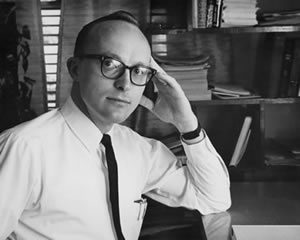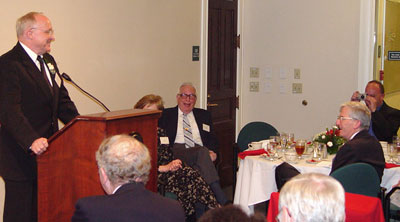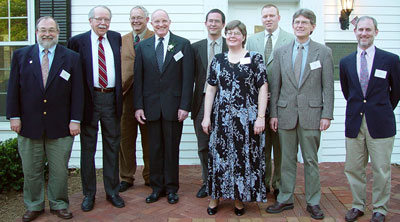Dear Alumni and Friends of the Wabash Department of Philosophy and Religion:
I recently returned from a year's sabbatical in Chicago, so most of my information about the year past will be second hand. I did come back last spring for commencement--the hardest rain for that day in living memory. It turns out that, with a newly remodeled and air-conditioned Chadwick Court, an indoor commencement is now merely disappointing rather than actively miserable. This year's graduating class of 147 included five philosophy majors and ten minors as well as sixteen religion majors and fourteen minors. (The roster of the junior class currently lists eight philosophy majors and sixteen minors as well as seventeen religion majors and thirteen minors.) Two philosophy majors and two religion majors made Phi Beta Kappa, and majors in our department won the Butler Prize for Scholarship and Character, the Daniels Award in Philosophy of Law, the King German Prize, the Peck Medal in Law, and the Moot Court Competition. It may well be that, in the current economic climate, it is seniors who landed jobs who deserve particular congratulations, but let me display an academic bias and mention in particular that Doug Finn (Religion) will be attending the University of Tubingen in Germany on a Fulbright Fellowship, Dan Galic (Philosophy) will be beginning a Ph.D. program in Philosophy at the University of Kansas, and Ben Kesling (Religion) will be starting his study at Harvard Divinity School. Matt McMullen also plans to start graduate study after a year teaching English in Japan.
 | |
|
Raymond as pictured in the 1967 Wabash |
 | |
|
Raymond, Hall Peebles (from behind), Raymond's brother Landon, Andy Ford, and Raymond's son Kevin at the retirement dinner. (Photo thanks to Steve Charles.) |
A sadder milestone this year was the death of Betty Dean, Eric's wife, after a protracted illness. Hall and Raymond both helped lead the funeral service, and Betty was buried next to Eric out in Oak Hill cemetery. His tombstone bears a quotation from the ancient Greek poet Archilochus--"the Fox knows many things; the hedgehog knows one big thing"--and the simple inscription, "Wabash College Teacher."
As already mentioned, I was on sabbatical this year. I spent the year as a Senior Fellow of the Martin Marty Center for the Advanced Study of Religion at the University of Chicago Divinity School. Given some of the things I've said in print about theology at Chicago over the years, it was particularly generous of them to welcome me so warmly. My newest book, Jesus the Savior, came out in February, and I spent much of the year editing a systematic theology textbook for seminary classes entitled Essentials of Christian Theology, which will be published next year. Thanks largely to the kind comments of my colleagues, and of some of you, I was chosen for this year's American Academy of Religion Outstanding Teaching Award, which will be presented in November. I'm reasonably sure that I'm not the best college religion teacher in the country, since I'm not even the best teacher in this department, but, to the extent that the award was really to our whole department, I think it was well earned.
Like me, Glen Helman was on sabbatical this year, though he stayed in Crawfordsville. Logicians have less need of big libraries to do their research. He continued his work in mathematical logic trying to finish a long-standing project to work out a new interpretation of formal proofs. I am particularly grateful, after holding the office for six years, to be able to pass on being chair of the department to Glen, who was a great help to me particularly in fields related to technology, where I badly needed the help.
Steve Webb was promoted to full professor this spring, an advancement richly deserved. Not only is he an excellent, passionate teacher--he may have been teaching more students in his classes than anyone else in the college this spring--but he continues his remarkable scholarly productivity. Brazos Press published his book Good Eating: The Bible, Diet, and the Proper Love of Animals last year, and I count at least a dozen articles and reviews published since. Steve will be on sabbatical this coming year--first semester as one of the first fellows of the new Center for Inquiry in the Liberal Arts at Wabash, and second semester at the Center of Theological Inquiry in Princeton.
Cheryl Hughes did a wonderful job serving as acting chair of the department while I was on sabbatical; it proved to be an unusually busy year (that's why I planned the sabbatical, of course!). She continues as editor of Social Philosophy Today, the annual publication of the Society for Social Philosophy, and she delivered this year's LaFollette Lecture, on "Integrity." She is just beginning a term as one of the co-chairs of Cultures and Traditions.
Bob Royalty's teaching ranged from his "home territory" in Bible to an innovative course that used digital technologies to study cities of the ancient Mediterranean to a course on Christianity and classical culture in the fourth century, co-taught with John Fischer from the classics department. Bob has completed a number of reviews and articles and chairs a new committee advising the Dean on the development of technology at Wabash.
After spending two summers of intensive (and I mean intensive) study of Chinese at Indiana and Michigan, David Blix put it to use by traveling to China this summer, a trip that extended from Beijing out to the far northwest oases on the ancient Silk Road. David continues to be one of the leaders in designing Cultures and Traditions, as well as serving as faculty adviser to Tau Kappa Epsilon, the Muslim Students' Association, and over thirty individual students.
Richard Lynch comes to the end of two years of superb teaching in philosophy for us--replacing first Cheryl Hughes and then either me or Glen Helman, depending on how things get counted. We're very pleased that Richard will remain at Wabash, as one of the fellows of the new Center of Inquiry into Liberal Arts.
 | |
|
Philosophy and Religion faculty last spring before Raymond's retirement dinner. (Left to right: David Blix, Hall Peebles, Bill Placher, Raymond Williams, Steve Webb, Cheryl Hughes, Richard Lynch, Glen Helman, Bob Royalty--photo thanks to Steve Charles.) |
We welcome two new colleagues to the department this coming fall. Jonathan Baer does work in American church history, bringing strength in an area that has never before been much represented in our department. Jon received his bachelor's degree from Duke and a master's from Cambridge in England (in political theory) before getting his Ph.D. from Yale, where his dissertation was on healing among Pentecostals in the late nineteenth and early twentieth centuries.
Helen Hattab will be teaching in the history of philosophy; her specialty is early modern philosophy, particularly Descartes' philosophy of science. She is Dutch, but, child of a foreign service family, grew up all over the world before coming to this country for university work at a Ph.D. at Pennsylvania. She has been teaching at Southern Illinois University before coming to Wabash. (For those wondering if Hattab is a Dutch name, I should perhaps explain that her husband, currently working to finish his Ph.D. at Tulane, is Palestinian, though he too grew up all over the world.)
As new buildings go up all around campus (science building, Center for Inquiry in the Liberal Arts, and Malcolm X Institute right now), as increasing numbers of applicants want to come to Wabash, as we continue to have large numbers of students and add new faculty members in our department, it seems a blessed time. I had expected to be teaching another ten to twelve years before retiring at 65. The way the stock market has been going, those plans may have to be changed (I think that's a joke), but just now more time spent teaching at Wabash seems a very pleasant prospect.
Sincerely,
William C. Placher
Charles D. and Elizabeth S. LaFollette
Distinguished Professor in the Humanities